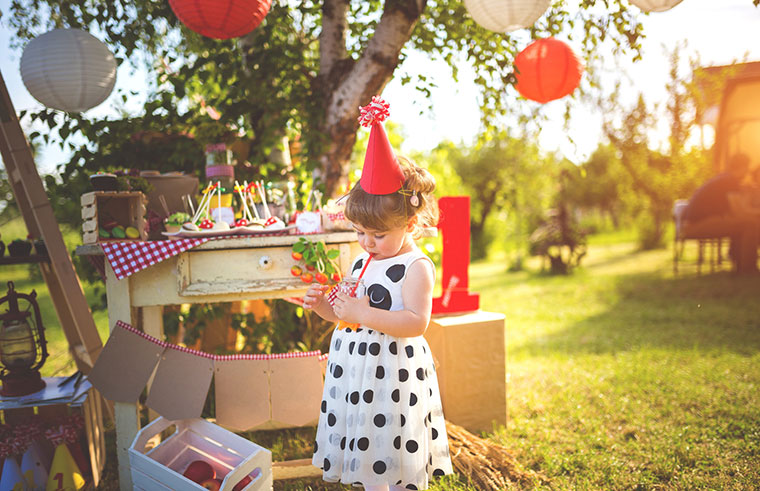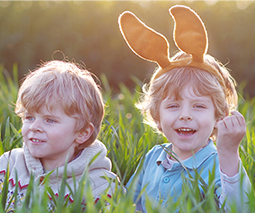How to throw an allergy-free birthday party

Organising birthday parties for young children can be absolutely exhausting, what with working out the games and preparing all the food.
These days, with the rise of allergies in kids, parties have become a little more complicated. Heidi Young, a clinical nurse specialist in childhood allergy and founder of The Nest, talks about how to make your next birthday party allergy safe.
Listen to Heidi Young on Feed Play Love:
Any dietary requirements?
It has become commonplace for wedding and adult party invitations to include a request for dietary requirements and Heidi suggests we do the same for kids’ birthday parties.
“Nowadays with the rates of allergy, it’s a good idea to have it on the bottom, as you would with a wedding invitation,” says Heidi.
“Most parents – especially parents of young children – are going to flag it probably 100 times over before the party, because it causes a lot of anxiety in parents of young children with allergies who are too young to speak up for themselves. I’d say to pop it on the bottom of the invitation to give them a chance.”
Prepare your own food
When it comes to food preparation, it’s best to do it yourself, rather than outsourcing.
“You can’t really fully trust outside catering,” says Heidi. “You’re really putting your lives into their hands when it comes to your own party. So I would definitely say to prepare your own food.”
Heidi also suggests giving the mother of a child with an allergy the opportunity to bring their own food. “The mum will be thinking about this and will definitely not mind you asking that question,” she says.
Oh no! My child has allergies!
It can be terrifying for a parent if their child with allergies is asked to a birthday party. “The first thing that goes through their mind is that every time the child is out of their sight or somewhere where there’s food, their life is at risk,” says Heidi. “It causes a lot of anxiety and sometimes it means they won’t go to a party.”
Parents of children with allergies will want to know what food will be provided, including what’s going to be in the lolly bags and what ingredients are in the birthday cake.
“The anxiety will be quite a high level because a birthday party does revolve around food and games,” explains Heidi. “So, I would definitely be having that conversation with the mother of the child with allergies, because they will be very anxious, but it also helps you to keep everyone safe as well.”
How to prepare
Heidi suggests finding out who is coming and what allergies they may have. “If there is a child with allergies, find out what kind of allergy they have,” she says. “If you find out what the allergy is then that can help rule things out – you don’t have to worry about things like peanut butter sandwiches if it’s an egg allergy.”
And be sure to get in contact with the mum to see what she’s expecting. “It could just be one conversation,” Heidi says. “It doesn’t have to be a big deal.”
How many children are at risk?
It is not really known what percentage of kids have allergies, as any allergy can turn into anaphylaxis at any point.
“We know that ten percent of under ones have a diagnosed food allergy. And four to eight percent over that age group have a diagnosed food allergy because they tend to grow out of it,” says Heidi. “But that’s still one in ten, that’s a huge number … the average is one or two per birthday party.”
Just too hard
Unfortunately, many kids with allergies simply miss out because other parents find it all ‘just too hard’ and don’t want to deal with the issue. But there’s no need to exclude these children.
“Food allergies are very common now and people are just going to have to get used to it and live alongside it,” says Heidi. “Just keep in contact with that child’s family. If you feel safer, or the parent feels safer, they can hang around in the local area, just to make sure that everyone stays comfortable with what’s going to happen.”
And just because a child does have an allergy, doesn’t always mean they will have a reaction. “Vast majority of the time, they have to actually eat it, swallow it, and get it in their bloodstream for them to have anaphylaxis,” says Heidi.
“So, the chances of that kind of thing happening are low. It’s still obviously possible, but there are ways to decrease the anxiety level so that everyone can have a good time.”
 Need some support to be the best parent you can be? Our Parent School parent coaching experts can help. Click to find out more or book a one-on-one session.
Need some support to be the best parent you can be? Our Parent School parent coaching experts can help. Click to find out more or book a one-on-one session.







